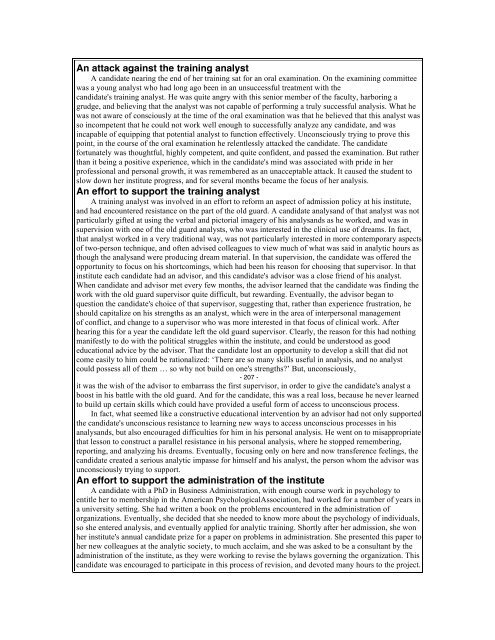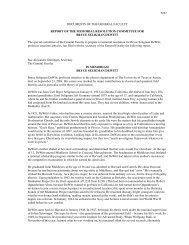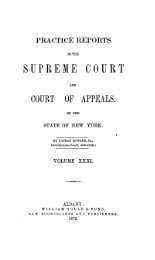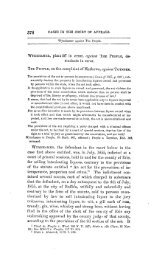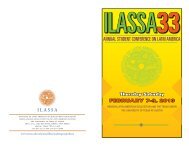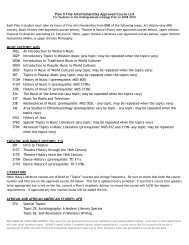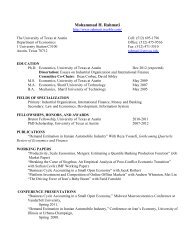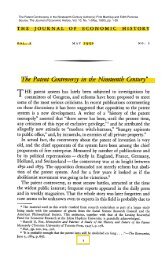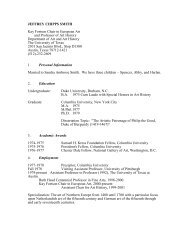The Educational Boundary. - The University of Texas at Austin
The Educational Boundary. - The University of Texas at Austin
The Educational Boundary. - The University of Texas at Austin
Create successful ePaper yourself
Turn your PDF publications into a flip-book with our unique Google optimized e-Paper software.
An <strong>at</strong>tack against the training analystA candid<strong>at</strong>e nearing the end <strong>of</strong> her training s<strong>at</strong> for an oral examin<strong>at</strong>ion. On the examining committeewas a young analyst who had long ago been in an unsuccessful tre<strong>at</strong>ment with thecandid<strong>at</strong>e's training analyst. He was quite angry with this senior member <strong>of</strong> the faculty, harboring agrudge, and believing th<strong>at</strong> the analyst was not capable <strong>of</strong> performing a truly successful analysis. Wh<strong>at</strong> hewas not aware <strong>of</strong> consciously <strong>at</strong> the time <strong>of</strong> the oral examin<strong>at</strong>ion was th<strong>at</strong> he believed th<strong>at</strong> this analyst wasso incompetent th<strong>at</strong> he could not work well enough to successfully analyze any candid<strong>at</strong>e, and wasincapable <strong>of</strong> equipping th<strong>at</strong> potential analyst to function effectively. Unconsciously trying to prove thispoint, in the course <strong>of</strong> the oral examin<strong>at</strong>ion he relentlessly <strong>at</strong>tacked the candid<strong>at</strong>e. <strong>The</strong> candid<strong>at</strong>efortun<strong>at</strong>ely was thoughtful, highly competent, and quite confident, and passed the examin<strong>at</strong>ion. But r<strong>at</strong>herthan it being a positive experience, which in the candid<strong>at</strong>e's mind was associ<strong>at</strong>ed with pride in herpr<strong>of</strong>essional and personal growth, it was remembered as an unacceptable <strong>at</strong>tack. It caused the student toslow down her institute progress, and for several months became the focus <strong>of</strong> her analysis.An effort to support the training analystA training analyst was involved in an effort to reform an aspect <strong>of</strong> admission policy <strong>at</strong> his institute,and had encountered resistance on the part <strong>of</strong> the old guard. A candid<strong>at</strong>e analysand <strong>of</strong> th<strong>at</strong> analyst was notparticularly gifted <strong>at</strong> using the verbal and pictorial imagery <strong>of</strong> his analysands as he worked, and was insupervision with one <strong>of</strong> the old guard analysts, who was interested in the clinical use <strong>of</strong> dreams. In fact,th<strong>at</strong> analyst worked in a very traditional way, was not particularly interested in more contemporary aspects<strong>of</strong> two-person technique, and <strong>of</strong>ten advised colleagues to view much <strong>of</strong> wh<strong>at</strong> was said in analytic hours asthough the analysand were producing dream m<strong>at</strong>erial. In th<strong>at</strong> supervision, the candid<strong>at</strong>e was <strong>of</strong>fered theopportunity to focus on his shortcomings, which had been his reason for choosing th<strong>at</strong> supervisor. In th<strong>at</strong>institute each candid<strong>at</strong>e had an advisor, and this candid<strong>at</strong>e's advisor was a close friend <strong>of</strong> his analyst.When candid<strong>at</strong>e and advisor met every few months, the advisor learned th<strong>at</strong> the candid<strong>at</strong>e was finding thework with the old guard supervisor quite difficult, but rewarding. Eventually, the advisor began toquestion the candid<strong>at</strong>e's choice <strong>of</strong> th<strong>at</strong> supervisor, suggesting th<strong>at</strong>, r<strong>at</strong>her than experience frustr<strong>at</strong>ion, heshould capitalize on his strengths as an analyst, which were in the area <strong>of</strong> interpersonal management<strong>of</strong> conflict, and change to a supervisor who was more interested in th<strong>at</strong> focus <strong>of</strong> clinical work. Afterhearing this for a year the candid<strong>at</strong>e left the old guard supervisor. Clearly, the reason for this had nothingmanifestly to do with the political struggles within the institute, and could be understood as goodeduc<strong>at</strong>ional advice by the advisor. Th<strong>at</strong> the candid<strong>at</strong>e lost an opportunity to develop a skill th<strong>at</strong> did notcome easily to him could be r<strong>at</strong>ionalized: ‘<strong>The</strong>re are so many skills useful in analysis, and no analystcould possess all <strong>of</strong> them … so why not build on one's strengths?’ But, unconsciously,- 207 -it was the wish <strong>of</strong> the advisor to embarrass the first supervisor, in order to give the candid<strong>at</strong>e's analyst aboost in his b<strong>at</strong>tle with the old guard. And for the candid<strong>at</strong>e, this was a real loss, because he never learnedto build up certain skills which could have provided a useful form <strong>of</strong> access to unconscious process.In fact, wh<strong>at</strong> seemed like a constructive educ<strong>at</strong>ional intervention by an advisor had not only supportedthe candid<strong>at</strong>e's unconscious resistance to learning new ways to access unconscious processes in hisanalysands, but also encouraged difficulties for him in his personal analysis. He went on to misappropri<strong>at</strong>eth<strong>at</strong> lesson to construct a parallel resistance in his personal analysis, where he stopped remembering,reporting, and analyzing his dreams. Eventually, focusing only on here and now transference feelings, thecandid<strong>at</strong>e cre<strong>at</strong>ed a serious analytic impasse for himself and his analyst, the person whom the advisor wasunconsciously trying to support.An effort to support the administr<strong>at</strong>ion <strong>of</strong> the instituteA candid<strong>at</strong>e with a PhD in Business Administr<strong>at</strong>ion, with enough course work in psychology toentitle her to membership in the American PsychologicalAssoci<strong>at</strong>ion, had worked for a number <strong>of</strong> years ina university setting. She had written a book on the problems encountered in the administr<strong>at</strong>ion <strong>of</strong>organiz<strong>at</strong>ions. Eventually, she decided th<strong>at</strong> she needed to know more about the psychology <strong>of</strong> individuals,so she entered analysis, and eventually applied for analytic training. Shortly after her admission, she wonher institute's annual candid<strong>at</strong>e prize for a paper on problems in administr<strong>at</strong>ion. She presented this paper toher new colleagues <strong>at</strong> the analytic society, to much acclaim, and she was asked to be a consultant by theadministr<strong>at</strong>ion <strong>of</strong> the institute, as they were working to revise the bylaws governing the organiz<strong>at</strong>ion. Thiscandid<strong>at</strong>e was encouraged to particip<strong>at</strong>e in this process <strong>of</strong> revision, and devoted many hours to the project.


